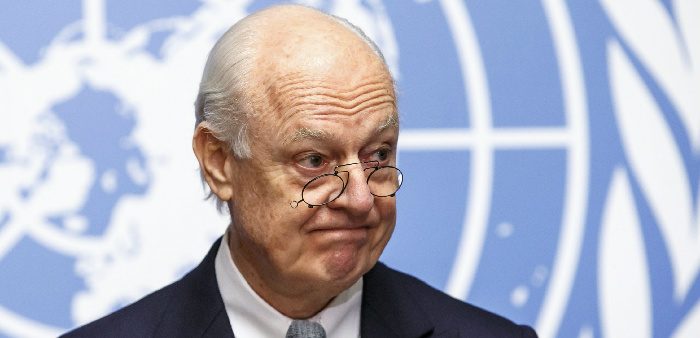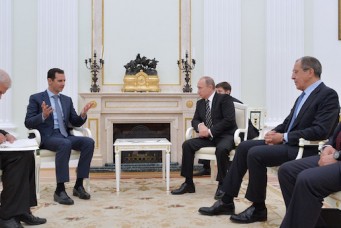Why Syria Peace Talks Are Doomed
The Damascus regime’s military offensive could ruin already slim chances for a negotiated peace in Syria. A divided opposition and rival great powers further complicate a tricky diplomatic initiative.

UN Special Envoy of the Secretary-General for Syria Staffan de Mistura, Geneva, Jan. 25, 2016. Salvatore di Nolfi/epa/Corbis
Currently postponed, the negotiations in Geneva to end Syria’s civil war, despite the valiant efforts of the United Nations Special Envoy Staffan de Mistura, cannot succeed under current circumstances. The Bashar Al-Assad regime, backed by Russia, Iran and Hezbollah, is too busy regaining territory on the ground and feels confident of an ultimate victory. The opposition forces are too divided between secular, religious extremist, and Kurdish nationalists to have a coherent strategy either on the ground in Syria or in Geneva. Meanwhile, the big powers, Russia and the United States, are working at cross-purposes.
Ever since Hezbollah’s victory at Al-Qusayr in June of 2013, the Syrian regime’s military strategy—likely masterminded by Iran’s Revolutionary Guards commander Qassem Soleimani—has been the establishment of a military front from the country’s northwestern border with Turkey down to the southwestern border with Jordan. This includes the major cities of Aleppo, Homs, and the southern city of Deraa. Such a line would, if secured, protect Damascus and the Alawite mountains, and secure the regime’s access to the Mediterranean. It would also allow free movement along the entire Lebanese border, providing strategic depth for Al-Assad’s forces and giving Hezbollah fighters and weapons unfettered movement (except for the occasional Israeli strike, of course).
The current offensives in Aleppo and Deraa, under cover of Russia’s round-the-clock bombing, show the regime is trying to carry through with the strategy, which is almost complete. Once in a position to cut off opposition forces from Turkey in the north and Jordan in the south, the regime could feel secure enough to negotiate from a position of strength. Or it might keep pressing the offensive until it retakes the rest of the country, even if that took several more years to accomplish.
The regime’s negotiating strategy, based on this military scenario, is to make it look like they’re complying with the international community’s desire for peace in Syria, while pushing for a military victory on the ground. Al-Assad’s stated goal of a national unity government would accomplish these objectives, given that it’s practically a call for surrender that the opposition would never accept.
The opposition lacks unity, and different factions appear unable to coordinate their strategies. To the extent there is a military strategy, several groups, among them the Free Syrian Army and the Islamic Front, have been trying to recover the initiative on the ground in the northwest, where they had been pressing the regime around Latakia before the Russians entered the fray, and in suburbs close to Damascus. These efforts have now turned into defensive operations trying to hold back regime advances on those fronts. In the north, the Kurds feel more confident and are fighting their own battles against the Islamic State in Iraq and Syria (ISIS), in an effort to secure contiguous territory along the Turkish border.
Politically, aside from the contentious issue of representation in Geneva, the opposition’s stated demands have been for humanitarian assistance to besieged cities, a durable ceasefire and a release of prisoners held by the regime, as preconditions to negotiating a transitional government. The opposition envisions a transitional government in which President Al-Assad would be represented, but would not hold full power. The ultimate goal would be a new system of government in which Al-Assad would have no role.
A national unity government and a transitional one are clearly incompatible. The first would be a return to the status-quo ante, with a slight adjustment to appease some opposition figures and the international community. The second would mean Al-Assad abdicating power, though he shows no intention of even considering that, nor do the Russians and Iranians seem willing to push him in that direction.
The U.S. and Russian positions are also clearly at odds. The Russians have entered Syria in force, establishing an airbase for their sophisticated fighter-bombers and missile systems, and have coordinated their bombing campaigns directly with ground action, thus helping the Syrian army win battles and in the process making a strategic difference on the ground. The United States, by contrast, has totally ignored key battles on the ground (starting with Al-Qusayr) and has been either oblivious or totally disinterested in recent strategic changes on the ground, focusing instead on continued air strikes of questionable value against ISIS, as if everything else didn’t matter.
Staffan de Mistura has followed a clever multi-pronged strategy, aimed at ensuring a long-term process that he hopes will eventually lead to peace. To start with, he has tried to be as inclusive as possible with opposition forces, which is not an easy matter given their divisiveness and the disagreements among their sponsoring nations. One way of doing that has been to be less concerned with formal roles and hierarchies around the table as with active participation in all discussions. Secondly, De Mistura has instituted a committee system whereby various issues could be discussed simultaneously, which saves time and gives second tier participants an active role to play in the process. It also allows the airing of different views and potential solutions to emerge.
Theoretically, this process could yield results, if all participants work sincerely and tirelessly within its rules. The main problem, however, is that the most urgent humanitarian situations are being left to negotiations rather than imposing an open-access policy for all humanitarian assistance at the very start of negotiations. Secondly, since no cease-fire is mandated, the winning side (currently the regime) is tempted to shun all compromises until they can totally impose their will on the losing side. Similarly, the losing side feels compelled to keep fighting in the hope of staving off defeat and forced surrender.
In a moment of exasperation with the opposition, U.S. Secretary of State John Kerry reportedly said, “You can bring a horse to water but you can’t make it drink!” A tireless and skilled diplomat like Kerry can be excused his moments of frustration, but such feelings should be directed at Moscow and Tehran. Al-Assad’s sponsors could prevail on him to end his ground offensive, if only to stop the humanitarian disaster on the ground and give the opposition a better reason to negotiate for peace.
Nabeel Khoury is a non-resident senior fellow with the Rafik Hariri Center for the Middle East at the Atlantic Council. On Twitter: @khoury_nabeel.
Subscribe to Our Newsletter



